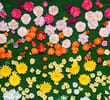Flower Superstitions
Flowers have been used worldwide for hundreds of years to communicate love, emotions and thousands of feelings. Roses were held in such high regard in the 17th century that they were used as legal tender. In the 19th century, Victorian homes almost always had two books available: a Bible and a flower dictionary. Giving the wrong flowers to a neighbour can have dramatic effects such as breaking friendships and ruining reputations.

Like many things in life, there are many superstitions around different types of flowers. Even if you don't believe some of all these superstitions, they are still quite attractive. Furthermore, understanding some superstitions can actually help you gain a better understanding of a particular culture and avoid offending someone by sending a bouquet that contains a certain type of flower.
Because flowers were such a unique form of communication, with subtle nuances that became an integral part of the culture, they also became an important centre in literature, art, and photography. Today, flowers around the world are used to celebrate, commemorate, comfort, and still communicate a variety of life events from birth to death and everything in between. In today’s blog, we will discuss flower superstitions around the world. Some believe it, and some not...just read it and gain information.
Dandelions are not only a tasty treat for honey bees, but they are also associated with some superstitions. If you choose one of these flowers (the dried variety) and blow the seed into the air before counting it, you will know how many years you have to wait to get married.

Poppies were often planted by farmers for many reasons. The farmers believed that if they wanted a good crop that year, then it was necessary to plant these flowers. It is also believed to help people forget their troubles. If you want to present someone with a flock of poppies, be sure to send a bunch that has 13 stems. More or less, poppies in the bunch is considered bad.

Roses Roses are the most famous flower in the world. Roses have many different colours, and each of them represents very different emotions. However, it is true that for most superstitious people it has the reputation of being the colour of bad luck. No matter if you give yellow roses or red roses or any color rose there are some or other superstitions attached to it.

It is said that roses are planted near someone's grave to protect their soul from evil spirits. The white rose blossom in autumn indicates an early marriage. Throwing rose leaves in a fire is said to bring good luck!
Marigolds are popular for many reasons and are often added to wedding bouquets. In addition to its aphrodisiac properties, marigolds are also believed to protect against witchcraft. Another interesting flower is anemone which protects you from disease and bad luck.

- According to some flower superstitions, a pregnant woman who eats tubers of orchids will give birth to a baby girl. But if her husband eats orchid tubers, the couple will welcome a baby boy.
- Flower pots with brightly coloured flowers should not be placed in the north, north-east or east direction, as these corners represent bad luck.
- Odd number of flowers was considered good luck if they were given as a present. However, an even number signified bad luck as they were commonly used for the dead. Red and white flowers were believed to bring further sickness or even death if they presented sick people to the hospital; white flowers that were heavily scented or whose flowers were dropping when presented to a sick person, were believed to predict his or her death from such an illness.
Flowers are such wonderful creations of nature which according to Feng Shui and Vastushastra can infuse energy and trigger positive and negative vibes. They are the forces of nature that help to sync life with themselves. Their strength and influence on the surrounding environment are simply amazing. Before you send someone online or offline flowers, make sure they are aware of the superstitions associated with them.















